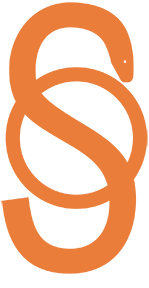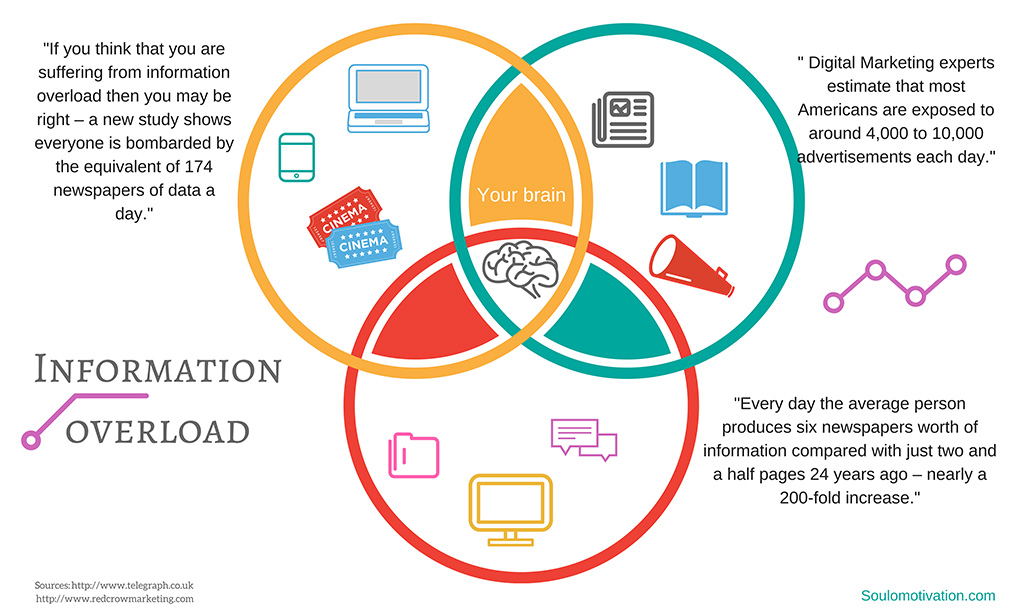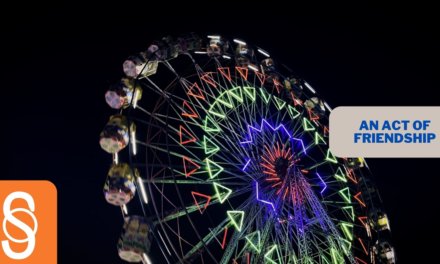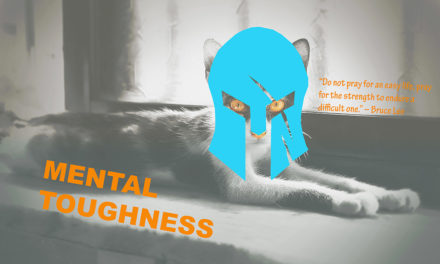Let’s start with the first question.
What is information overload?
Here’s a citation from Wikipedia.
“Information overload is a term used to describe the difficulty of understanding an issue and effectively
making decisions when one has too much information about that issue.”
Stats for the infographic were taken from telegraph.co.uk and redcrowmarketing.com I highly recommend
checking out both the articles for an in depth view of the situation.
Next who coined the term “Information overload”?
Continuing from the same source,
“This term is popularized by Alvin Toffler in his bestselling 1970 book future shock.”
In this age of information technology we are prone to it than ever before. Giant media companies are
pumping out articles at the speed of light. 2 million blogs are published every day.
The ability to reach millions of people at the same time through social media has become a prime source of
information overload. We just know so much today that we have stopped considering whether any of it is useful.
As we know everything, as everything has been said and done, we find nothing amusing and nothing
motivating enough to take action on. Therefore brainless cat videos are a hit this days.
At least the cats are doing something new every day, it’s just for laughs and very little thinking is involved.
Now those of us who are reading actionable information on the web, get such a bulk amount of it, in the
end there is more confusion rather than clarity. We have spent so much energy on thinking that we feel
exhausted when the time to act comes.
So let’s understand how to avoid information overload, get things done and make progress in general.
1. To know the output, first input is necessary
Say if you want to start an online business. You start learning about how to make websites, how do they work,
how can you earn money from them and what sort of content you should be posting to garner more
readers?
Now every field in its own is an endless abyss if you keep exploring. Reason being new information is added
every day, what was best practices back then is a bad practice now. What was considered to be the standard,
now merely is a starting point.
In order to make everything better, perfect and completely functional you keep on reading, researching and
gathering information for all the problems regarding starting a profitable website.
Now what are you missing out? You are missing out the most critical step in the process, which is first creating a website. Even though there are best practices in every profession, every individual or website faces its own unique problems no matter what. If those are unique problems how are you supposed to find the answer to them online? Nobody faced them until now.
The more you read the more you are cluttering your mind. There is no surefire way to know an output of a
particular decision or action. The only way to know is by taking the first initial step.
Amount of information gathered exceeding the amount of action taken always equals to a more profound confusion.
You keep finding answers, those answers create more questions and the wheel spins on and on. Where is the time to act?
Here’s how to handle it:
1. Have a plan but only know enough until the first step. Step 2 will be revealed on its own.
2. Take the first step, start doing something. Over-analyzing will only create more doubts and loss of energy.
3. Gain information progressively. If step 1 is executed, then start learning about step 2 and so on.
Learning consistently is essential for growth but if your learning does not equal to the amount of action you take then ultimately it will bog you down.
2. Too many cooks spoil the broth
When there are too many ways to do something, when there are too many opinions about a single thing and
when one thing can be approached from a varied number of angles there is bound to be confusion.
Information overload does that. Now information does not simply come from the things you read and watch
but also from people around you. Going around asking opinions from a number of people, just because
you think no one has given you a definite answer, you are bound to create a conflicting opinion.
Which in return will not allow you to take action. The purpose of seeking that information is lost, which
was to take action, now it merely has become a search for a definite conclusion and the ultimate solution.
Sometimes we do understand that people are saying the truth, however when it is not the answer you are
expecting, you will go around looking for people who justify your point of view. Simply to buy more time for doing nothing and continue procrastinating.
We can maybe consider this as a rule of thumb; take suggestion from someone whose advice is action oriented rather than exhaustive theorization.
There might come a time when there are multiple roads to a single destination, at least it will seem so and you
might find yourself wondering which one leads to where you want to go?
In that case instead of just stopping at the junction and theorizing about which one is the correct road, make an instinctive decision based on whatever information you have and start moving forward. Sure, you might also have to take a U turn to get back on the right track, however in life you always learn something very useful each time you venture into unknown territory. Even a passerby could guide you towards the right direction.
Or even better you might just discover a phenomenal shortcut that no one else knows, which has outstanding
scenery, pleasant road and no traffic at all. Result being you reached your destination quicker, with a good mood.
All this is possible, only if you decide to act. Start whatever you can immediately. From wherever you can.
There is no pre prescribed qualification for taking action.
3. How to avoid information overload
I am a very avid learner. Once I start learning something, I cannot stop myself from knowing all that there is to it. It helps you make great progress very fast, while it’s great to have such a spirit, on the other hand it exhausts you quickly.
Your endurance definitely increases over time and you can continue learning for longer and quicker.
I always make sure that I am acting as much as I am preparing. If I catch myself learning too much and applying very little, I completely stop whatever that which I am reading or watching, take a small break, clear my head and get going with applying all my lessons.
Because I have observed that sometimes when you are learning so much you seem to realize that you know very little. Considering the vast amount of data everything has. The more I learn about photography or filmmaking, the more of a noob I feel. There is a certain amount of stress involved as well. Because I have caught myself thinking, I have so much further to go if I want to create some world class art.
I start theorizing, calculating and making strict deadlines, about how much should I learn every day to be great at this in 5 months 6 months etc. The learning process which was fun earlier now has become a burden. Do as much of learning in a day no matter what or you are doomed for life. The enthusiasm is killed.
I have also observed after certain amount of reading, I simply cannot read a word or two more. My mind cannot simply focus. Reading becomes such a difficult task. To the point where I cannot even process a single word.
Now according to neuroscience your brain requires time to rewire, reconfigure and make sense of any new information that it has captured. It could be kinesthetic information or just brainstorming, whatever it is the brain requires time to reconfigure your entire system according to it. Even the thought process changes. So bogging down more information is simply useless.
Instead of making progress it hinders your progress. There should always be a balance between learning and action and action and rest.
So whenever I catch myself in that loop, I completely distance myself from that particular subject. I start experimenting with whatever I know.
Knowing without testing your knowledge is like going for a swim because you know how swimmers move their body. You will drown. True feedback about how well you have grasped your subject matter only comes through enacting it.
When I read I think I understood how to use a particular editing technique, when I try to use it, I understand I forgot certain key steps because of which the results are undesirable. So Instead of learning further, I go back and improve what I have learnt. This brings a certain level of confidence in me, I know I will be able to nail it the next time.
So:
1. It’s important that you test your knowledge as soon as possible. So that you can go back from an early point rather
than visiting a presumable grave.
2. As soon as you notice you are not taking enough action as compared to the information taken. Stop collecting anymore.
Stop reading. Stop watching. Stop listening.
3. Start focusing all your energy on taking the first step, then the next step and then another.
4. Start learning again only when it’s absolutely necessary for making progress. When you understand by action that beyond this point new informative tools are necessary.
5. Stop stuffing your brain with unnecessary information. Facebook posts from people you barely meet/know. News which does not impact your life directly. Public forum discussions on hypothetical scenarios or questions. Like “do aliens exists?” is not very productive, keep room for useful information and energy for productive action.
6. See if you can minimize your social media use.
7. Maximize participation in only action oriented discussions. Discussions which lay down the points for tomorrow’s ground work.
8. Adopt a mindset of better “be uninformed rather than knowing which does not add value to my life.”
9. Know the only definite answer is action and experience.
10. You know what is right deep within. Stop looking for an easy way, a quick way and start working immediately. That’s the most easy it gets.
Conclusion
Now there are number of other repercussions of information overload. Number of types with each to his own specific.
Like communication Barriers created by information overload. I might cover topics like that in future, if I get enough demand for it.
For now I think Just knowing in general how it affects our life and how we can avoid it is enough. It will automatically clear away the debris.
My blog is all about achieving the right thought process, which will make you able for taking motivated decisions all the time. So this topic definitely deserved attention. It was actually suggested by a friend, because there was a time when he suffered from it.
Alright it’s a warp. As always your opinions, doubts and suggestions are most welcomed in the comments section. Let me know how I can assist you better.








